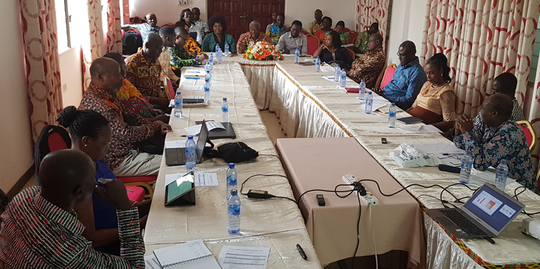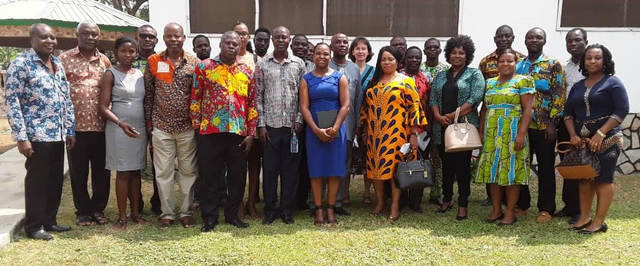Meeting with Ghana National Learning Alliance identifies opportunities for joint working on sustainable intensification
In late January, the Sentinel Ghana team met members of the Ghana National Learning Alliance (NLA) at the Science and Technology Policy Research Institute of the Council for Scientific and Industrial Research (CSIR-STEPRI). The meeting’s aim was to identify areas of collaboration between the two groups and explore how their work may complement each another.
The Ghana NLA sits under the Sustainable Agricultural Intensification Research and Learning in Africa (SAIRLA) programme. It is a multi-stakeholder platform comprising technocrats from government departments, researchers, journalists and members of civil society organisations, all with an interest in promoting the sustainable intensification of agriculture.
The alliance supports a social learning process around three themes identified as being particularly important in the Ghanaian context:
- Services: Pesticide access and policy (case study – Fall Armyworm);
- Equity: Gender and climate-smart agriculture investments;
- Trade-offs: Alternate protein sources for sustainable livestock feed resource management and smallholder decision-making around inputs.
Participants explored the three Sentinel research clusters:
- Understanding agricultural expansion
- Understanding the socioeconomic and environmental impacts of agricultural expansion
- Understanding trade-offs between food security and conservation objectives
Together, the groups identified the following areas of shared interest:
- Agricultural expansion and agricultural intensification are intrinsically connected. Ghana’s Ministry of Food and Agriculture (MoFa) has the ambition to promote sustainable agriculture that makes responsible use of natural resources. Agricultural expansion is the less desirable option – food security and rural livelihoods should ideally be achieved via agricultural intensification and the development of thriving agribusinesses, and not by expanding agriculture into natural habitats.
- The drivers and dynamics of agricultural expansion are poorly understood and documented in Ghana, with relevant data and information scattered between different line ministries and departments. Sentinel can make a meaningful contribution by consolidating the knowledge base on expansion, and support inter-departmental and ministerial collaboration. NLA members are interested in understanding whether current trends of agricultural expansion could be reduced (and if yes, by how much) if intensification of agriculture were accelerated.
- The equity and gender dimensions of agricultural expansion and intensification are of great interest to NLA members. Little is known about the role of women and youth in agricultural expansion and the decision making processes that influence choices of expansion versus intensification of agriculture.
- The expansion of crop lands also affects the livestock sector, where crop lands expand into grazing lands. To some extent, this can be addressed by changes in the livestock husbandry system, but the scope and scale of this dynamic is not well understood.
There is clearly wide scope for continued engagement by Sentinel with NLA members, even beyond the duration of the SAIRLA programme (which ends in December 2019). The meeting went a long way in clarifying objectives, interests, ways of working and areas of potential collaboration. Both sides agreed to continue the dialogue.

